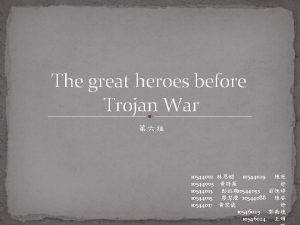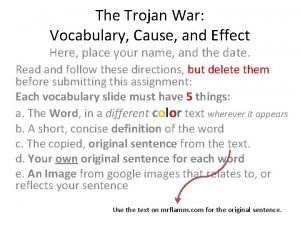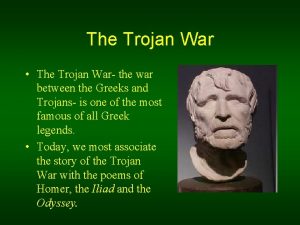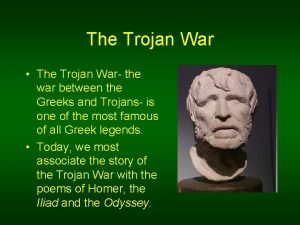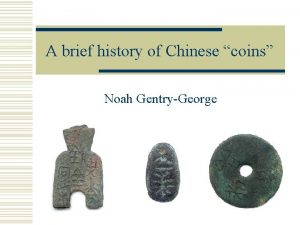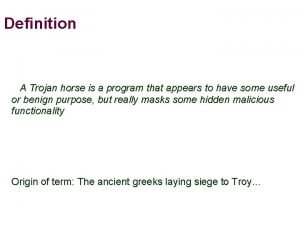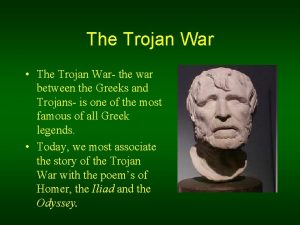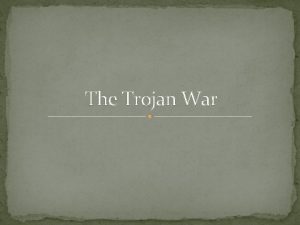The Trojan War English 12 Mrs Kinney FYI




























- Slides: 28

The Trojan War English 12 Mrs. Kinney

FYI • • War actually occurred Troy fell into the hands of the Greeks 12 th century B. C. ; 1193 -1184 B. C. War was probably caused over conflict between commerce and trade between Greece and Asia Minor

Effect on Trojans • City left in ruins • Women became slaves to Greeks • Left to mourn loss of great heroes and family members

Effect on Greeks • Lost faith in selves • Lost many men • Loss feeling of safety

Mythological Beginning/Causes of the Trojan War • Wedding of King Peleus ( a mortal) to Thetis (sea-goddess): parents of Achilles • **Prometheus foretold that Thetis’ son would be greater than his father, so Zeus decreed that Thetis should marry a mortal

The Wedding – All gods and goddesses invited except Eris, goddess of discord – Eris angry—tosses golden apple inscribed, “For the fairest one” – Hera, Athena and Aphrodite all claim prize – Not willing to judge with his wife as one of the choices, Zeus sends them to Mount Ida where Paris, son of Priam, king of Troy, was tending his flocks – Each goddess offers Paris bribes

Bribes • Hera—kingship; power and riches • Athena—glory and renown in war • Aphrodite—love of most beautiful woman

Beginning Cont. • Paris chooses Aphrodite’s bribe and wins Helen, wife of Menelaus, King of Sparta • Under the protection of Aphrodite, Paris travels to Greece; he meets Helen, his chosen • Because Helen was sought by many suitors, Odysseus swore an oath to protect her and avenge any wrong to her

Continued… • Paris made love to Helen, and aided by Aphrodite, persuaded her to leave with him for Troy • Menelaus, Helen’s husband, king of Sparta, sends out a call to Greeks to help him get her back • Agamemnon, king of Mycenae and brother to Menelaus, chosen as commander

Principal Greek Warriors • • • Achilles Ajax Diomede Odysseus/Ulysses Nestor

Principal Trojan Warriors • • • Hector, son of Priam Aeneas Deiphobus Glaucus Sarpedon

• War was fought, according to myth, because of quarrel among gods and betrayal among mortals – Intervention/Competition of gods (wanted personal glory) – Divine Intervention • Zeus—arranges tremendous loss of Greek lives so that Achilles will be begged to rejoin his men— fueling progression of war

• Helen uses Aphrodite’s pressure as excuse for engagement • Hermes—helped Agamemnon • Gods meddling with human lives by offering spiritual gifts and people, taking pieces of human souls

Personal Biases • Athena—encourages Hector, Trojan hero, to fight Achilles, knowing it will lead to his demise • Hera—favors Greeks; rejected by Paris at wedding

Competition/Jealousy • Hera, Athena and Aphrodite compete with bribes to be named fairest

Mortals • Achilles vs. Agamemnon over war prizes • Achilles and Hector—importance of honor, major part of identity • Pride in homeland (Greece or Troy) • “Face that launched a thousand ships: -Helen of Troy – Single combat between Paris and Menelaus

FYI • According to some, the ultimate cause of the war was the judgment of Paris • Achilles—fated to die in battle; only surviving son of King Peleus and Thetis

The Iliad by Homer • Begins with quarrel between Achilles and Agamemnon • Greeks were unsuccessful at first and had taken neighboring and allied cities over • Achilles accuses Agamemnon of being the cause of their misfortune because Agamemnon refused to give the priest of Apollo’s daughter back

The Gods/Goddesses • Greeks – – – Athena Hera Poseidon Hermes Hephaestus • Trojans – Aphrodite – Ares – Zeus (tried to remain neutral but did not) – Apollo – Artemis

Action • Paris challenges one of the Greeks – Menelaus accepts the challenge and wins – Aphrodite helps Paris escape and carries him away in a cloud/mist – Greeks claim victory

Achilles vs. Patroclus • The Greeks’ surgeon is wounded by an arrow from Paris’ bow • Achilles passes by and cannot see who is wounded and sends his dearest friend, Patroclus, to find out • Achilles will not go back to fight and Patroclus wears his armor to “scare” the Trojans back

• The Greeks succeed in driving the Trojans back • Hector confronts Patroclus who throws a large stone at him and misses • Patroclus is mortally wounded in the scuffle by Hector • Hector, believing he has killed Achilles, takes his armor and puts it on • News travels back to Achilles who swears revenge

Achilles Mourns • Achilles mourns for his friend’s death and Thetis hears him • Thetis requests Vulcan/Hephaestus to make him a better suit of armor than he lost

Death of Hector • The rest of the Trojans had escaped the oncoming Greeks, yet Hector stood determined to await combat • Priam, the king of Troy and Hector’s father, begs him to retreat • Hector sees Achilles and retreats into the walls of Troy • Athena tricks Hector into thinking she is his bravest brother, Deiphobus

• Hector is strengthened by the sight of his brother and goes to fight Achilles • He throws his sword and it just falls from the shield of Achilles; realizing he has been tricked by Athena, he rushes forward to meet his fate • Achilles throws his spear, delivering a mortal wound • Hector begs him to give his body to his family so that they may mourn and properly bury it; Achilles refuses

• Achilles, instead, after killing Hector, pierces Hector’s feet and threads strips of rawhide through them • He then drags his body behind his chariot as he rides around the walls of Troy • Hector’s wife mourns his death • Achilles drags the body of Hector twice around Patroclus’ tomb • Hera orders Thetis to prevail upon Achilles to restore the body of Hector to the Trojans after Apollo preserves it • Priam appeals to Achilles himself to get Hector’s body back and Achilles, moved by Priam’s words, grants the request • Achilles pledged a truce for 12 days for funeral rites

The Fall of Troy • The story of The Iliad ends with the death of Hector and The Odyssey picks up from there • Achilles falls for King Priam’s daughter and influences the Greeks to make peace with Troy • While in the temple of Apollo negotiating the marriage between himself and Polyxena, Achilles is struck by a poisoned arrow shot by Paris, which, guided by Apollo, fatally wounds him in the heel (Achilles heel/tendon)

The Trojan Horse • Eventually, the war comes to an end • A huge wooden horse was constructed by the Greeks (Odysseus’ idea) as an offering to Athena • The Greeks then sailed off while the Trojans were told if they gained possession of the horse, they would triumph over the Greeks • So, they take the horse into their city • Inside the horse, Greeks hid until the Trojans slept and they opened the gates to the city for the other Greeks • The city of Troy was set on fire and people killed by the sword, completely destroying Troy
 Golden apple trojan war
Golden apple trojan war The great heroes before the trojan war
The great heroes before the trojan war Greek god of honesty
Greek god of honesty Trojan war god
Trojan war god Cause and effect vocabulary
Cause and effect vocabulary Theme of trojan war
Theme of trojan war Was there really a trojan war
Was there really a trojan war The great heroes before the trojan war
The great heroes before the trojan war God of war ares symbol
God of war ares symbol Rebecca kinney
Rebecca kinney Ridley metodu
Ridley metodu Kinney encoder
Kinney encoder Kinney philippines
Kinney philippines Matris yöntemi
Matris yöntemi Fine kinney method
Fine kinney method Asvab career exploration program
Asvab career exploration program Interpreting asvab scores
Interpreting asvab scores Fyi l
Fyi l Asvab program fyi
Asvab program fyi Asvab program fyi
Asvab program fyi Airbus fyi
Airbus fyi Coin fyi
Coin fyi They are mrs garcia and mrs castro
They are mrs garcia and mrs castro They are mrs garcia and mrs castro
They are mrs garcia and mrs castro Mrs. darling was ___________ of mrs. s.
Mrs. darling was ___________ of mrs. s. Trojan horse letter pdf
Trojan horse letter pdf Dennis m. bushnell
Dennis m. bushnell Lrk v4 trojan
Lrk v4 trojan Trojan horse define
Trojan horse define

